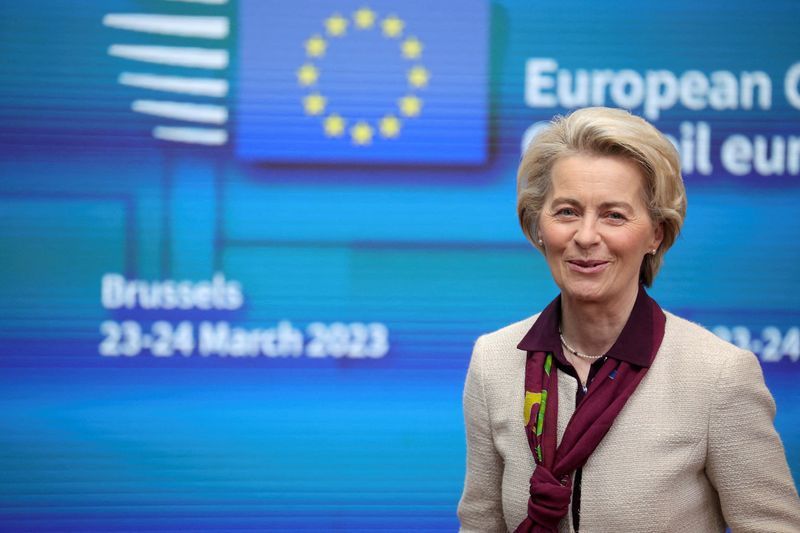BRUSSELS (Reuters) - European Commission President Ursula von der Leyen will travel with French President Macron to Beijing for a joint meeting with Chinese President Xi Jinping on Thursday, having said the European Union must reduce its economic dependence on China.
Von der Leyen said the bloc could not decouple from China, but needed to reduce risk and "rebalance" economic ties.
The following outlines ways in which the EU relies on the world's second-largest economy and elements of its strategy to reduce its exposure.
TRADE DEFICIT
The EU's goods trade deficit with China has widened, particularly since the COVID-19 pandemic, to reach 396 billion euros ($432 billion) in 2022 from 145 billion euros in 2016, as imports more than doubled and exports rose by 50%.
China accounts for 20% of EU goods imports and 9% of its goods exports.
TRADE IN CARS
EU producers have succeeded in exporting cars to China, with shipments increasing to 24.3 billion euros worth in 2022, some 56% higher than in 2016. About 80% of EU car exports are from Germany.
China is the EU's third largest outside market for its cars, and some 15% of EU car exports head there.
By contrast, the trade in electric vehicles (EVs) shows the EU in clear deficit. Chinese EV exports to the bloc shot up to 6.9 billion euros in 2022 from less than 800 million euros in 2020.
A study by PwC forecast nearly 800,000 cars built in China would be sold in Europe by 2025, roughly double the 2022 level. Just under half of them would be from Western automakers with production in China, such as BMW and Renault (EPA:RENA), and just over half from Chinese producers, such as MG and BYD.
CRITICAL MINERALS
The European Commission under president von der Leyen, has proposed the "Green Deal Industry Plan," which places the focus on securing more raw materials, boosting its clean tech manufacturing sector and reducing reliance on China.
For supply of rare earths, used in wind power generation, hydrogen storage or batteries, Europe is 98% dependent on China. For battery mineral lithium, the dependence is 97%, and for magnesium, one of the EU's 34 "critical raw materials", it is 93%.
In many cases, the minerals are not extracted in China, but processed there. The EU wants by 2030 to be processing 40% of the critical raw materials it consumes.
CLEAN TECH
The EU imports 80% of its solar panels from China, importing 21 billion euros worth in 2022.
Under the EU's proposed Net Zero Industry Act, public tenders for green projects would make it harder for bids to succeed if they are from countries supplying 65% or more of a particular technology or product type, such as photovoltaic cells, wind power or heat pumps.
This is part of an EU goal of producing at least 40% of the solar panels, fuel cells and other equipment it needs for its green transition.
The Commission is also looking into possible controls on outward investment that might cover 'dual use' products that could, for example, have military applications or surveillance technology.
($1 = 0.9173 euros)
